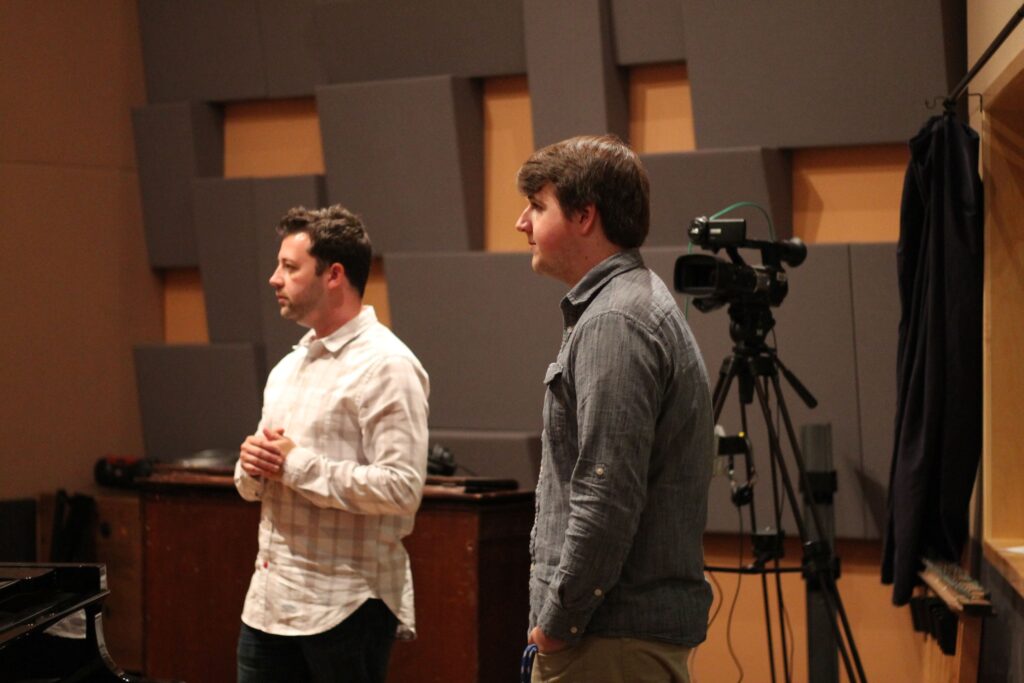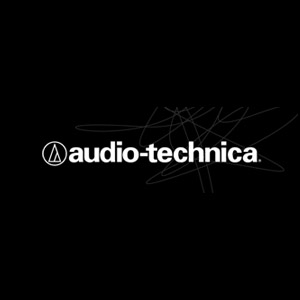An Afternoon with Manny Marroquin

Grammy winning mix engineer Manny Marroquin recently took time out of his busy schedule to stop by the Conservatory and impart some words of wisdom upon our CRAS cadets.
He spent a few hours with us, talking about how his life has progressed since he was born in Guatemala, through what it took for him to succeed and end up making an incredibly successful life as an all around audio engineer, focusing specifically on his dreams of becoming a mix engineer.
His body of work includes Christina Aguilera, John Mayer, Taylor Swift, Lana Del Ray, Dia Frampton, Rihanna, U2, Lupe Fiasco, Whitney Houston, 2 Pac and countless others. He has also recently developed and released a line of high-quality innovative plugins in his signature line from Waves.
Manny graciously visited our school and did an open interview and Q&A session in our live sound venue, all set up through our student chapter of AES, headed up by Jim Naron. He provided great answers to the questions that CRAS student Ike Schultz had arranged and eloquently asked him, as well as opening the floor to questions from newly started students beginning their trip down the road into the audio industry.
We now have this portion of Manny’s interview available on video format on our Youtube channel at youtube.com/crasaudio!
Jim Naron: My name is Jim Naron, if you don’t know that already. I’ve never done this before, but I am super comfortable right now because I see a lot of faces that I recognize. This is awesome. I am the faculty co-advisor for the AES student chapter. Before we get started here, I’d just like to have everybody express good studio etiquette, and go ahead and power off your cell phones. We can’t have any interruptions during the presentation, please. We have Manny in the building tonight. Before we get into that, I would just like to talk to the student body a little bit about our AES chapter here at CRAS, and the Audio Engineering Society in general. Did you know that the Audio Engineering Society has over 14,000 members? Over 95 sections, and over 75 student chapters, and out of these our chapter here at the Conservatory is recognized as being the most active. Isn’t that amazing? The only way that we are able to uphold this reputation with AES is with our AES student body representatives. Nicholas Wylie, AES President, student chapter. Michael Martinez, vice president. Justin Foley, secretary.
These guys work hard and plan events for you, like the mic build, like the music theory clinic, and the home studio clinic. They plan this stuff every Wednesday night here at the Gilbert campus. During this time they also host things like general audio discussions and music genre discussions. This is something extracurricular and educational that you guys can get involved with at no cost. So if you would like to know more about AES and how you can get involved, contact one of these guys or myself, or just show up to one of the meetings. We want to get more people involved with AES. It’s pretty special! AES is putting on this presentation this afternoon to inspire you through the words of one of the great engineers of our day, Manny Marroquin. This is truly amazing and it’s such a pleasure to have Manny here this afternoon. Before we bring Manny out, let me introduce you to our host. We’ve had the pleasure of spending the last eight months with this guy. It’s been such a pleasure hanging out with him. He’s probably one of the most polite guys you will ever meet. Such a humble guy. I’ve spent a lot of time talking to him about music history, doing sessions with him and really connecting with him. He’s getting ready to embark on a three month internship. He just had his exit speech last week. Ladies and gentlemen, please welcome to the stage, Mr Ike Schultz!
Ike Schultz: Thank you so much Jimmy. Hello everyone! Good afternoon! How is everyone doing today? Good, great, marvelous, fantastic? All of the above on the scantron of life? It’s great seeing all of you here. For those of you who don’t know who I am, my name is Ike and it’s an absolute pleasure to be here speaking with all of you this afternoon. Now, as you know, today we have a very special guest visiting the Conservatory. He’s graciously taken time out of his busy schedule to come speak with us and share his insights and experiences for the next couple of hours. Now, for those of you who are unfamiliar, our guest is definitely what we could call a heavy hitter in the industry. He is a five time Grammy winner. Manny is one of the most successful, influential and in-demand mix engineers today. His discography is a massive statement containing a wide diversity of a variety of A-list clientele. His skills and expertise have influenced the recordings of John Mayer, Tupac, Whitney Houston, Katy Perry, Taylor Swift, Justin Beiber, Maroon 5, Bruno Mars, Alicia Keys, Mariah Carey, Usher, Jay-Z, Rihanna, Kanye West…I mean the list goes on and on. If I had it in my hand right now it would be like a Santa Claus wishlist kind of thing rolling down the stairs here! But all kidding aside, Manny’s body of work and the work that he has contributed to is immense. It’s not only influenced our industry, but really music history as a whole. So, I think it quickly becomes clear why it’s such a privilege and an honor to have him here at the Conservatory for the first time. Alright. So, enough of my jabbering. Who’s excited?! I know I am. It’s great to be a part of this event, and I’m really glad that all of you are here. Alright, so if all of you could please help me give him a warm reception here. Let’s welcome for the first time, at the Conservatory of Recording Arts and Sciences, Manny Marroquin!
Manny: Thank you guys! Wow, what a great group! How are you all doing today? I’m excited to be here, thank you for having me. I enjoy talking to guys like yourselves, ready to embark in this exciting world of audio. Congrats to you guys for making that move and good luck. So for these next two hours, whatever you guys want to ask me, I’m here for you guys. I hope to share as much information as we have time for. So any question! Boxers, briefs, anything!
Ike: Thank you so much Manny. Before we begin, I just want to say on behalf of myself and the entire student sector of AES, as well as the whole Conservatory community, thank you for coming here. It’s truly an honor. Since a large portion of the demographic of the audience out here are students that recently decided to pursue, gain, and hopefully maintain a career in the audio industry. I think that a lot of that decision, for many of us, stems from a passion for music and sound, either early in life from studying music, or film, TV or anywhere sound is a facet, so I wanted to start up this discussion by asking you first, how did your interest in music, and by effect audio, begin? When did you consider, or even knew it was a career? How did that start for you?
Manny: Well, it started…I think we all here have a passion for music. So you have to understand that to be successful at this, you have to be passionate. One thing they don’t teach you in school, is they don’t teach you passion. How do you teach passion? I think I discovered it at some point when I started playing drums. I’m a drummer. I felt really connected to musicians. Every time we did together there was this really cool connection with every one I played with. I went to a music high school, sort of like FAME. I don’t know if you guys remember that, maybe you’re too young. I saw a drummer there audition right before me, his name was Abe Laboriel. I don’t know if you guys know Abe Laboriel, he plays with Paul McCartney. He’s probably one of the baddest dudes alive. Right there I quit playing drums. I quit because I will never be this good, and I’m gonna shift my focus to something else. At that time the school Hamilton Music Academy had a small production room. They had a SMPTE track, and we had a little MIDI studio. We had a reel to reel 8 track, and a 24 channel Ramsa board. That was the first time that I discovered the art of sound.
So what we would do is we would produce a song on Monday through Thursday, and on Friday we had to present it to the class. On Thursday we had to record it and do a little rough mix. We all had to play everything, we had to play all the parts. When it came time for mixing, during the rough mix, it was really interesting for me to discover that you have so much control over emotions of frequencies and sounds. I didn’t understand that, because I’m not playing a chord. Everything’s been recorded, but the fact that I can add aggression with compression, aggression with EQing, with levels, simple level changes. How I discovered that the emotion changed when I had the different levels. That was really powerful. I was like, “Oh, sh*t! You can actually do this. I didn’t know it existed.” That’s when it started. I must have been 16 at the time. From there, like you guys, I lived it, I breathed it. It was 24 hours a day, listening to music, trying to record it, trying to do rough mixes. Trying to play.
My whole life was based around music. So for you guys…how many of you guys play instruments here? It isn’t too late. It’s never too late. It’s not like you have to master something. Just pick something up, you know? Understand just basic music theory, basic chord changes, basic arrangement. You should do that and you should start now. So that’s where I started, I was in high school and I’ve been passionate ever since. I’m more passionate today than I was back then, believe it or not.
Ike: I believe in the mixing process, just having that creative element…again, after everything being recorded, you have an effect on the emotional perception of that piece that gets purveyed to the audience. It’s definitely a powerful thing.
Manny: It’s an art form for sure.
Ike: Absolutely. Being so inspired by the studio that you had at the Hamilton Art Institute, what artists or records influenced you early on? Anything that stands out really?
Manny: Yeah, I grew up in LA and all my friends, we all listened to hip hop, rap at the time. But all my musician friends were into Led Zepplin and stuff like that. I gotta say listen to it all! I know that sounds a little corny, but this is the first piece of advice for everyone in the room. You can not discriminate with music. Period. So if you’re closed minded like “I hate country music” or “I hate hip hop, I hate rap, all I hear is boom boom boom,” or “I hate rock, all I hear is noise.” That is closing your mind, and your ego is getting in the way. That’s not good for our industry, we’ve got to be really open minded. You guys got to really appreciate it. You’ll learn more from the stuff you hate, than you will from the stuff you love. Just remember, not only do we have to be really passionate about what we are doing, but we have to be really open minded. Because if you’re close-minded, the open-minded guy sitting next to you will go right past you, and you’re not even going to realize he went right past you. So, don’t discriminate.
Listen to all kinds of genres. Go listen to “Kind of Blue” and study “Kind of Blue”, even though you’ll never work on jazz. Listen to emotional records. Analyze why is it that you feel a certain way when you listen to “Stairway to Heaven”. Analyze it. Listen to stuff you wouldn’t normally listen to. That is the first assignment when you leave. Listen to something you wouldn’t normally listen to, and listen to it as far as why you like it, and why you don’t like it. Trust me, you do that every day of your life, for the rest of your life, you’re going to learn so much, just by listening.
We forget to listen. We’re more about knobs and faders and monitors and Apple+D, but we forget that why we got here in the first place is because we love music. We enjoy being around creative people. So there’s still the creative process. What you guys are going through here is a very technical process, which is necessary, but don’t ever forget that it starts with the right brain, which is the creative side. That’s going to keep the left in balance.
Ike: Great. As you discovered an interest in music, and as you went through your high school and you started to experiment in the MIDI lab at that small studio that you had there…How did you discover that there was a career in engineering? I know that for many of the people out here, it’s relatively recent that they channeled their passion for audio into making the decision to making it their career. What was that transition like for you?
Manny: Well, you know, I knew I wanted to be a mixer at 16 and I was lucky that I knew that really early. It goes back to me wanting to be around music all the time. Knowing that engineering at the time was not as cool as being a producer, but I knew there was an art form that I wanted to explore. At the time I knew that jobs existed, so I just went for it. I wanted to pursue my dream. I knew it was a dream. I’m from Guatemala, a small country in central America, so I wasn’t even born here! So the odds were totally against me. But it wasn’t impossible, and there were more people that tried to talk me out of it, to be a technician, to do something else. But whatever you want to do, if it comes from the heart and if you’re willing to work hard at it…
We’re in a generation of entitlement. A lot of people think it should be given to you. Let’s break that. Especially you guys! Let’s break that. You gotta go and get it. I tend to curse a lot, and I’m sorry, but go get that motherf******! You know, don’t settle. It’s not going to come to you. Go get it.
Ike: Definitely. Your passion, and your dreams, that’s the best kind of motivation for you. So touching on when you made the decision to have engineering as your career, clearly that was your passion early on and you wanted to pursue that. To my knowledge, you began working at Enterprise as a runner, and you kind of worked your way up the studio, through that whole process. I wanted to ask, considering that to many outside parties that is kind of an unconventional career trajectory, if you will, like pursuing the studio life. I wanted to ask what was that experience like for you, and was that a difficult decision for you to make?
Manny: Yeah, listen. Nobody wants to be a runner, or an intern. But I feel like it just trained me to appreciate when I became an assistant engineer. I didn’t skip any steps, by the way. What I ended up doing…in high school I went to a similar school like this [CRAS], though it was not as cool and hip as this one. But, after that I got a job as a runner. Runners get the coffee. Then I went to assistant engineering. Then I went to engineer. Then I went to mixer. So I didn’t skip anything and I’m very grateful for that because I know it all. I know the studio life and every aspect of it. It just helps me. It helps me stay humble.
Being humble is very important to me. Listen, we’re not saving lives here, we’re not heart surgeons. It’s entertainment, this is fun! You’re paying me to mix your song? What?! The way I see that is any time somebody asks me to mix their song, I honestly feel like someone is handing me their baby, their newborn, and saying “here, I’ll be back in 24 hours. Take care of my baby.” And I gotta be responsible and feed them, burp them, or whatever, clean their diapers. I take it very seriously. I’m honored that someone would trust me with their baby. That’s like, that’s a pretty big thing for me. That’s why being humble helps you stay focused so that you appreciate the guy that brings you their baby. Some babies are a little uglier than others. But you’ll appreciate they baby, and you’ll take care of the baby, and that’s really important. If I’m a client, or producer, artist or label, I want that person to take care of my baby. If I can see that person is going to take good care of my baby, I’m going to keep going back to that babysitter. Hey, we’re glorified babysitters!
Ike: Absolutely, it’s someone’s life’s work that you’re dealing with on a daily basis. So definitely show respect and humility towards that. That’s definitely just. Since you worked your way up through the hierarchy of the studio, and experience is the one thing you can’t get for free, did you have a strategy when you came into the industry?
Manny: Nope! I wish I had! It was just about “you know what, I’m gonna work my ass off. I’m gonna be better than the guy next to me,” you know, in a very humble way, but I’m gonna kick your ass. That was my approach, I was going to be better than anybody else and I wanted to be the best. And I still want to be the best, but not to be cocky about it. No, I wanted to be the best that I could be. I know it sounds a little corny, but yeah, I just wanted to do the best mixes, I wanted to work with the best artists. I wanted to be diverse in the genres. I didn’t want to just do one thing.
I’m lucky enough to jump from Imagine Dragons to Kanye West to Mayer to the Rolling Stones. And that to me is loving music, so I don’t get to do just one genre. That was a very conscious decision from earlier in my career. I remember calling my manager, thinking I want to work with this guy Citizen Cope. He’s like, “Yeah, but you’re going to lose money doing that, why would you do that?” I knew that he was going to help my discography, because I wanted to do more stuff like Citizen Cope. And it worked! I didn’t make as much money as some of the other projects, but it helps the brand and the career. For me it was just personal, I wanted to work on different genres.
Ike: So, here at the Conservatory, we emphasize technical skill. By virtue of being an engineering school, we are teaching the fundamentals of a variety of concepts in engineering. But something that really plays a role is people skills, something that you’ve clearly developed to consistently be as in demand as an engineer overall. How do you approach your attitude in this environment?
Manny: Listen, what’s going to get you through the doors is a good attitude. I tell my kids, just learn to say thank you and please and those two words will get you far. When I’m hiring assistant engineers, technical knowledge is important, but it’s not everything. You gotta be able to be in the room with people you like. Listen, I’m in the studio – by the way if I sound crazy, it’s because I only had three hours of sleep. I probably have had 10 hours in the last 5 days because I’m working on a couple albums. But I’m here with you guys because I feel that that is important. But that’s just my life, that’s normal. Having three hours of sleep on days is fine, I’m cool with that. So if you like sleep, you better change that.
It’s important to be a good people person. When I’m hiring an assistant, I don’t want an assh*le in the room with me for 14 hours a day. I don’t want someone to tell me his technical skills. I don’t want someone to tell me how many records they’ve mixed, or engineered, or demos they have. I want a good person in the room. I want a person who shows the passion, the fact that they want to be there, and they want to learn, and be humble about it. So those are the qualities that I look for. I guarantee you 99% of my peers will say the same thing. So if your attitude is not right, you’re not getting a job. It’s just that simple. So knowing that personality trait from now will help you. Like knowing “oh yeah, I’m kind of an assh*le sometimes”, well now you can work on it.
Ike: Gotta recognize the problem, right? So, what I wanted to touch upon next was that considering just the engineering career and the industry as a whole is a very volatile thing, constantly changing, I think that it definitely holds true that it’s not the most intelligent necessarily, or the strongest that survive, but the ones that are the most adept to change. Considering how so many things have changed throughout your career, were there any days that were harder than others? Did you ever have a point where you questioned your career choice?
Manny: Yeah, of course. It’s a very challenging field, and there are a lot of challenges. We have to adapt constantly. I always say you have to get used to rejection, because you will have a lot of that. So as long as you know from the get-go, ok rejection – I can take it two ways. I can be like, oh f*** you and put your tail between your legs and run; or you can take it as constructive criticism, which is where you put a positive twist on something that is negative. That’s the way I approach it. So when I have those bad days, I want to learn from the bad days…You know what they say, about experience and being wiser? Learning how you’ve adapted to those bad mixes or bad days or crappy songs that sometimes we get…those days actually help you.
So again, the theme is turn a negative into a positive. You’re going to have a lot of negatives, you’re going to hit a lot of brick walls. I always say this really corny analogy that do whatever it takes to get over that wall, whether you go to Home Depot and buy a shovel, or you get a pole, or a jack, it doesn’t matter. The point is you’ve got to get over that wall. You have to be willing to fight to get over that. So you are going to have moments where you’re going to feel like “I hate this song, I hate this guy’s guts. He’s so talentless. I’m way more talented.” You’re going to have those days. But you’ve got to remember, as my high school mentor always said, “Never forget what you were hired to do.” Simple.
If you remember that, man you will get so far. If I’m mixing a song, and I’m with Kanye, and I tell him his production sucks…that’s not my job. Or if I tell him I don’t like the song…my job is not “Hey, let’s hire Manny to give us his opinion on the song.” My job is to mix the sh*t out of that record, and that’s it. I’m not going to give them production notes, I’m not going to give tell them anything, unless he asks me and I genuinely think he wants to know my honest opinion. Now the people skills kick in.
I think that after you guys graduate, if you go get a psychology degree, it will help you as much as something like this, because you do have to read people’s mind, you gotta read their body language. You have to know if they had a bad day, a fight with their girlfriend, wife, boyfriend, whatever. You’ve gotta know what mindset they are at at that moment. That’s when it becomes difficult for a lot of people. It’s art. The art of dealing with people is probably more than the skills you have as an engineer, mixer, producer, artist. You’ve got to be able to have those people skills. This stuff you guys already know. My advice is now you have to apply it. If you’ve made the commitment to come to a school like this, this is part of that curriculum. You’ve got to work on stuff like that. If you’re a nice guy, be a nicer guy. It won’t hurt you.
Ike: That’s great. Now reflecting on your early career, and developing all of your people skills, both technically and in general, dealing with a variety of clients, and being a mix engineer you’re right in the middle of that record making process, where you are one of the key elements in making a finished product…I wanted to ask, how do you deal with the varying opinions and the varying needs of all the different parties involved, whether it be producers or artists, or what have you? How do you make that compromise and manage that?
Manny: That’s an excellent question. Have you guys heard of a group calledGrouplove? It’s a really cool band. Their album is about to drop in the next few weeks, really cool band. When I was mixing their album, well I mixed half of it, they all showed up. All five of them. The A&Rs showed up, their manager, I had like seven people in my tiny room. They all had an opinion. Everybody has an opinion! In entertainment, like movies and music, everyone has an opinion. From the janitor to the CEO of Google, everyone has an opinion.
Part of my job as a mixer, I have to take all of that information and I have to process it. Somewhere in there I gotta know how far…I have to entertain everything, because they are the clients. But at the same time I have to make sure they’re not hurting whatever the song is to my taste. That’s where it becomes very delicate. Again, I’m hired to mix the song, I’m not going to tell him his bass part is off, that’s not my job. So when the bass player goes “Hey, my bass isn’t punchy enough, loud enough, crunchy” whatever that is, and the singer goes “no, no I think it’s too crunchy, or too punchy.” Right there alone, they have to make that decision. But now it’s my job, that within x amount of time, if in two minutes they can’t compromise, then I step in. “Why don’t we try this? Listen to this. Is that what you’re talking about?”
“Oh yeah more punch!”
“No, that’s not what I want!”
“OK, what if we do this?”
Now you’ve got to be a good delegator. Now they’re engaged in the song again. Everybody’s got that ego, where the bass player at some point thought his bass part was important, and the singer didn’t for that particular sound…Now my job is to get them engaged with the track again. Now they’re listening again. Now maybe the ego got in the way of the bass player. He realizes that when I soloed it, then un-soloed it, he goes “oh sh*t, it is there! I can hear it.” Boom. So the psychology of that kicks in. Sometimes there’s no resolution. When that happens, I’ll do two versions of it. You want one like this, this is the other one. Live with it. I guarantee if you live with it for a day or two, you’re going to come back, you’ll take, and you are going to pick one version. And it’s done.
So you try to simplify everything. They’re there for you to make them feel comfortable as well. So your job is, if there is any friction – and there’s going to be! There is no right or wrong, I’m not better than you. The singer’s not better than the drummer. It’s a compromise and how do we get there. And that’s why they hire mixers still. Anybody can mix a record. You guys are all mixers and producers. But I feel like they come to someone like me to kind of give them a little more of a taste. Like, hey, would you do it like this? And my job is to say “Yeah, I see where you’re going. But what if you do this, this and that?” They’ll be like “Oh sh*t! That’s exactly what I was hearing in my head, I just couldn’t execute it.” That’s what we are there for.
Sometimes some songs need more love than others. Some producers are great sonic producers, that when you come in, stuff sounds incredible, what am I gonna do to it? Once you get in the song, twenty things come to mind, and you execute them, whether it’s dynamics, color, filter, a hundred things can come into play. So your job as a mixer is to kind of put it all together. Give you a little bit of what my taste would be. If I’m working on a Rolling Stones song, how would I like the Stones to sound in 2013? They could get 20 other mixers but they said “oh let’s see what maybe Manny can do. Maybe he can bring an element of this or that.” The way I approach it is, how would I like to hear them? I would like to hear the Stones like this. Charlie needs some major cojones, let’s give him a little more kick drum. Let’s round out the kick. Not to be pretentious, not too young, not too aggressive, but yet big and bold, and all these words come into play. How do we get that with frequencies. Oh you add this, you take away that. Balance-wise, the snare needs to be tinkered with to match the kick. And you go on and on.
Ike: To go back in time and reflect a little bit, do you remember your first break in the studio? The first opportunity that came to you besides maybe just helping out as far as coffee or food or things like that. That first kind of break that happened for you.
Manny: You know it’s the classic story where we were all over-tired, working on the project. The engineer couldn’t handle it anymore and he goes home, and I was the assistant, and they go “can you take over?” And I was like hell yeah! Then the client goes, “hey can you do a rough mix?” Hell yeah. Six in the morning I play him the rough mix, I wake him up, and he picks up the phone and calls his partner in New York and says “Yo, I just found someone who is going to mix the album.” And I’m like, what?! I was like 19 years old. That I remember being a break.
By the way, that album never got released, it got shelved. But it gave me the confidence to think maybe I do belong here. It gave me that confidence. And then I pursued it. I did a lot of foreign records, I did a lot of Japanese, Taiwanese records earlier, which was great because none of my friends heard them, so I could f*ck up as much as I could and no one would judge me on it. Like, “Yo, that kick on that song man…” So that was great and I did that for a couple years, and that was really good training. And you know, my career never went like that…And I’m so happy for that. You know, I pay my dues, man I just work my ass off. I always said, one mix at a time. I was always very under the radar, I never wanted to be that guy who was “Hey check me out!” I just wanted to do good work, good quality work. People eventually find out, they’ll be like “Oh yeah, Manny makes that. Oh cool!” It just got bigger and bigger. Again it was based on being passionate about it and trying to be the best I can in a very humble way.
Ike: That’s a great attitude to take. Now that you are where you are, and your career has progressed, I wanted to get some perspective on what’s a typical work day for you?
Manny: I wake up at 8 in the morning, and stay at the studio until 8 in the morning! 24 hours! No…I go in the studio around 1 or 2, and I stay until 1 or 2 in the morning, sometimes stay until 5 or 6 in the morning. Whenever I get tired. Deadlines, of course if I have a deadline of course I have to finish it. But if it’s a typical day I just work until I don’t feel inspired anymore. That’s when I know that I’m either too tired, or bored, and I need to get some rest.
Your social life is not going to be the best. My wife is probably like “Yup!” But, listen, you take the good with the bad and I wouldn’t change it for anything in the world. I get paid to do what I love to do. How many people can say that? I read something that said less than 1% of the population actually enjoys what they do. Hey, I’ll take that. I’ll take the long hours, I’ll take the 3 hours of sleep to do what I truly – not like – but love to do. I just still can’t believe that people pay me. Sometimes I feel like some day they are going to walk in and say “Alright, time’s up!” And I’ll be like alright, cool. 20 years later, alright you got me! So it’s definitely worth the sacrifice, that’s for sure. Maybe not for everybody, but for me it’s worth the sacrifice.
Ike: Absolutely. If you’re doing something that makes you happy, everything else is…
Manny: Nothing.
Ike: Exactly. Being in the position that you are in, being so successful and active in the industry – for the students I wanted to ask what are the skills that an aspiring engineer should possess or work towards acquiring, whether that be something technical…
Manny: This guy’s got some really good questions! Wow! Well first, you gotta find good hair product. That’s number one. You gotta, like I said earlier, you have to have knowledge of music and instrumentation, arrangement, all of that. Like I said, if you don’t play an instrument, go learn how to play basic chords on the piano, guitar, doesn’t matter. That gets you engaged in listening to music in a different way. You must possess that first and foremost, whether you are doing engineering, mixing, production, all that. Go learn an instrument.
The other thing is listening skills. Listen to music all day long. Now with Spotify and all this stuff, I think music is at its best, at least for me. I’m more excited about music today than I’ve ever been, because it’s so accessible. I can get up and go to Sonosand play anything I want anywhere. So listen, listen, listen. Do not discriminate, like I said earlier. Learn an instrument.
Now you’re going to begin the technical process. Now you’re like “I love this song, how did they get that bass sound?” Now you’re here. Now maybe you can ask one of your instructors “Hey would you get this bass sound?” Oh easy, you do this, you overdrive the preamp, you do this, you shelve that. OK, cool. So now you’re going to learn all these technical skills. But before you do that, you wouldn’t have asked that question if you weren’t passionate about some of the music. So again, the most simple one is appreciate and admire, and don’t discriminate music. That would be the first one. The others will just kind of follow. You’re doing it now.
You’re at a great school, you’re learning the technical side of it, which is obviously necessary, but it’s just a tool that you must have. The other is the dedication, the desire, and the passion. There’s a great book called “Drawing From the Right Side of the Brain,” and it’s just that, it’s about drawing. But what happens is, and I’ve said this a million times, we live in a left brained society, meaning the way you brush your teeth, how you tie your shoe laces, the way we drive. Everything is left brained, the technical side. They say that the right side doesn’t really get tapped into.
So, what I did, to become a better mixer, is I started drawing, because I felt how visual artists, they have to tap into the right side of the brain. They have no choice. But they also have their tools, and that’s the left side. This is how you mix these colors, this is your brush, what type of brush, is it on canvas, on wood…But I took drawing lessons to be able to tap into the right side of the brain. So there’s a great book, and you don’t have to do all the exercises on it, but it will teach you how to subconsciously and consciously tap into the right side.
Here’s an experiment for you guys. Listen to a song with the lights super bright. Then listen to the same song and turn all the lights off. Just analyze what the emotional difference is. And you’re going to notice it, and start analyzing it and store it in your brain. Oh, it made me feel this way… Same thing with the right side of the brain. That’s where the right side of the brain kicked in. It wasn’t distracted by light or other things, so your right side subconsciously kicked it. So you listen to it from a different perspective. That’s our job. We need to make sure we listen to it from a technical side and from a creative side. And it’s gotta be equal. It can’t be too technical, because then I’m not as creative. I can’t be all creative and not technical because then all my meters will be in the red and then the mastering engineer is going to curse me out. So you gotta really try to read about stuff like that, and how to tap into the right side of the brain.
Ike: So touching on qualities that you like seeing, as far as open-mindedness, and things that you prioritize and think are important, such as using both the right side and the left side of the brain, and looking at something both technically and creatively – I wanted to ask what qualities do you like to see in an intern, or an employee that you work with? What are things you would like to see out of those individuals on a regular basis?
Manny: No tattoos, guys! I don’t like tattoos! Kidding. Again, personality. I want to be in the room with someone I can joke around, f*ck around with, go get a beer, or have sushi. But at the same time be able to work with me, because I work man. I put it in. I don’t take any shortcuts. I’m working harder now than ever, so I’m a workaholic. I need someone that can keep up with me. Someone that’s sharp, that wants to learn. Someone that if they can’t remember it, write it down. We may say “call so and so and so and so” and if you think you can remember all of that, great, but 99% of the people can’t hold that type of information all the time. So the moment you forget that’s the moment you’ll f*ck up. So write everything down.
I look for someone who has great personality, first and foremost. You can know everything about tools and all the shortcuts that I don’t really care for, but I have to learn sometimes, you may know all of those and I could care less. If your attitude is just not cool, then the clients are going to notice. I want my team to be a reflection, an extension of me. I’m just an easy-going guy, so I don’t want anyone in there that when an artist like John Mayer walks in…I want him to be as comfortable with them as he is with me. First and foremost is your attitude. And then if you know all those really cool shortcuts, then that’s a plus!
Ike: Definitely. I agree, you can teach someone Pro Tools, but not necessarily how to be a good person.
Manny: Yeah, and I think schools like this help. Schools like this should, and I’m sure they do, teach you studio etiquette. Man you’ll get fired so fast if you don’t have studio etiquette. Your career will last 20 seconds, you know! That’s why you’re here, to learn what qualities you need to possess to be successful. You could do post too, it doesn’t matter. We could do John Mayer, to post, foley, it doesn’t matter. Just a good attitude, a thank you and a please will get you far.
Ike: Touching on qualities that you think are important for anyone to possess in this industry, something else that I wanted to touch upon a little bit is whether you are a student juggling sessions and homework and studying and all the various things that happen in our lives, or whether you’re 20, 30, 40, 50 years into the industry, I think that time management is something that everyone has to deal with. So I wanted to ask you, how do you approach time management? Being so in-demand and just such a busy guy in general, how do you manage all of your time, how do you deal with that?
Manny: Man, this guy is good! Again. I’ve done a lot of these, and this guy asks some of the best questions. I’ll tell you that is really good. I set my iPhone alarm. Last week I had three rooms going, which I don’t recommend, but I had to for deadlines. So I will set my alarm.
I will be in John Mayer world, because we were finishing the album this Sunday, so I’m in his room right now, and I set my alarm for an hour. And I say this hour is going to be quality time. This guy named Babyface, have you guys heard of Babyface the artist? He’s the one that gave me the best piece of advice. I’m like you have Russell Simmons, you got Puffy, you got all these people calling you, President Clinton, everyone’s calling him, right! He had won back to back producer of the year at the Grammy’s. He had done the Clapton song “Change the World”, and he was at the top of his game.
I was working, I was engineering for him at the time, and he…I just couldn’t understand how he was doing that multitasking. I asked him this same question. He said it’s all about quality time. If I’m a producer for 10 minutes, an hour, 6 hours, I’m going to be the best producer. If I’m going to be a husband, or if I’m going to be a father for an hour, I’m going to be the best. So, understanding quality time, it really stuck. I was like, oh that’s how you do it. So I tried to apply that. If I said last week, from 2 to 3 o’clock, it’s John Mayer. And I’m going to give it 100% John Mayer from 2 to 3. At 3 o’clock I’m going to go to the other room and I’m doing John Legend. So I set my timer, that’s the only way I can do it. If I get lost in John Mayer – it’s easy to be creative and all of a sudden it’s 8 and you’ve got two other sessions. So that works for me. I just set a simple timer, I’m just going to allocate that time. I’ve learned over the years how to take advantage of that hour consciously, and make it a very effective hour.
What I would have done 10 years ago would have maybe taken me six hours instead of one. So, it’s funny you ask that. That’s a key because you have all of these projects, and you have all of these deadlines, and you’ve got to deliver on time. So the iPhone is really handy!
Ike: Oh yeah, I can definitely imagine. I’ll tell you right now if I was mixing a John Mayer tune I’d definitely lose track of time.
Manny: Oh yeah, whether you’re a fan or not, it’s good stuff. He’s a really, really incredible artist. And seeing him work, it’s one of those projects I really look forward too.
Ike: Definitely. He’s one of my personal favorites. So I wanted to shift gears a little bit. Now that we’ve reflected and talked about the progression of your career, and the attributes and things that you think are important, I wanted to dive in a bit more into what you do specifically as a mix engineer. It’s rare that we have a mix engineer of your caliber here visiting the school, so I wanted to dive in a little bit and maybe get some perspectives on how you view things as a mixer. What’s your philosophy on dynamics in a mix? Considering, especially the clientele you are working with, radio play is a very serious consideration that you have to always be thinking of and I think everyone in here to some degree is familiar with the whole loudness wars debate that is constantly pervasive and happening today. What’s your approach on dynamics in a mix and does it change based on the material that is in front of you?
Manny: Great point again. I do a lot of pop records as well. I do from Justin Bieber toFlo Rida and Enrique, I do a lot of that stuff. I also do some alternative, maybe likeLinkin Park and Imagine Dragons and FUN. And I’ll do folky stuff like John Mayer or Dixie Chicks have the Court Yard Hounds. Genres have a lot to do with that, so let’s just stick with one – we’ll say pop for the radio and the loudness and all of that. My number one priority in a mix is always dynamics. That’s it. So that’s the first thing that I do. And drums, I’m a drummer so I always start with drums, even if there’s no drums in the song!
So the rhythm section has to be tight, it has to be important. It doesn’t matter what genre, but if we’re doing pop…the loudness war, what is happening, and we’re going to get a little technical here. What happens is the louder you get, there’s a perception of the loudness that sometimes actually has a negative effect on dynamics. So you have to be really careful. Louder isn’t necessarily better for the emotion. Again, dynamics for me is about emotion. Every mix that I do I focus 100% on emotion, I’m an emotional guy. I want to ride this roller coaster, this three minute roller coaster. If I’m in the verse I am aware of where I am at every single time when I’m listening to it. Now if I’m at a chorus, then I know if I’m in the first or second and I know what to play with. I know my sections. Arrangement. Pop music it’s super super important. You know the intro is going to go here, to there, to there, you know you can visualize the lines. But if I’ve hit my ceiling and I can’t go any louder than this, then what I do is I’ll go to the point in the song that I feel should be the loudest. It could be the second chorus, most of the time it would be the chorus after the bridge, or a wrap, which is the outro or the vamp.
So I start with that section and I’ll make it as loud as possible, and then I work backwards. So then in the section before that, I can’t be as loud as that or there is no emotional shift. Now how can we do that? Well simple enough you can bring the volume down, but when you bring volume down then the energy goes down. So now you gotta make decisions, do I want my energy to stay like this if it’s one of those tracks, or do I want to do this, or that. That’s when you have to make the decision, do I use volume? Do I use compression? Do I use EQ? Do I use filters?
I use a lot of filtering, low and high passing. Not as an effect, but as an emotional transition, meaning if I want my verse to be softer than my chorus, I will filter some of the stuff within the track, and I will automate the filter, but you won’t know that. When you listen to it, and the chorus pops, you’re like “Oh sh*t! Here it is!” But, the level will maybe be the same, but the emotion will be different. Now you can achieve this with processing some of the frequencies out. So that’s why I play a lot with low pass and high pass filters, a lot of EQing, and that’s when it gets exciting when you start playing with colors to achieve emotion.
That’s why I fell in love with this. So there’s different techniques that you can achieve without necessarily always being full on. Now what happens to a loud mix, there’s a fatigueness that happens. You have to be very careful with that, when your mix is so loud and so hyped, but it’s one of the greatest songs written, but it doesn’t become a hit in the pop world. It doesn’t get played as much on the radio or it doesn’t chart well. What happens is it is your job to make sure it’s not fatiguing. I’ve learned that when I listen to a song and I feel during the three minutes really stressed, and I’m like “f*ck, I need water or something,” like I’m stressed out just listening to this incredible song by the way, but I don’t know if I can listen to it again. Now you’ve really f*cked up, because the song didn’t reach it’s potential.
So it’s our job to make sure that if it is a loud song, that you mindf*ck the listeners. That’s kind of my job. I’m trying to mindf*ck people into thinking this section is lower, but it really isn’t. It’s lower in frequencies and compression, and sometimes volume. Simple as half a dB or a dB makes a huge difference. But I don’t want you to know that. Of course you know that, you guys are here for that. But I don’t want the listener to be aware, like whoa! Where did that come from? Why is that so loud all of a sudden!
So there’s different techniques that we all use for that perceived loudness. If this is my ceiling, my mix cannot start and end there, because you just kill the song. The song is done. You’ll never be able to get it back. That’s the thing, next time you listen to music, Music Appreciation day today, when you listen to something else, listen to the perceived loudness, the dynamics. Why does it sound louder? What instrument makes it sound a certain way? Why is it that guitar in the vamp jumps out and my body language changes, my shoulders raise a little…why is it that guitar? Oh that tone. I got it. When I listen to a song…I didn’t mix “It’s Time” by Imagine Dragons, but I love that song. They played it for me and I thought it was a smash the first time I heard it. But there is a guitar in the vamp that comes in, and I remember thinking – this was just last year you’d think I would know this by now – but I appreciate the fact that this guitar came in the vamp. If you analyze that song, that guitar makes the song, in my opinion.
That is the moment when every time that I listen to the song, I can’t wait to get to that moment. Again, whoever mixed that…it’s a part of production/mixing. They got me, again they are mindf*cking me into thinking “I can’t wait for this section of the song.” So the next song I mix I naturally add a bunch of mids to a guitar in that section. And not that it worked, but it inspired me to work on dynamics. I can go on for another three hours talking about dynamics, but that’s in a nutshell what all you guys have to be aware of.


























